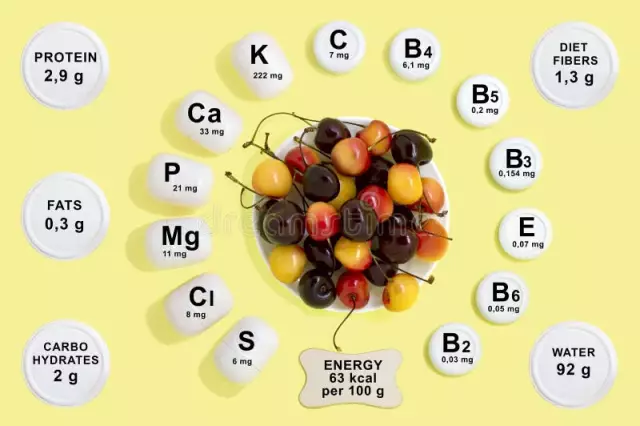- Author Rachel Wainwright wainwright@abchealthonline.com.
- Public 2023-12-15 07:39.
- Last modified 2025-11-02 20:14.
Calorie content of apricots

Apricot is a woody plant of the genus Plum of the Pink family, producing small fruits from pale yellow to bright orange with a large pit. The homeland of this fruit is China, from where apricots spread throughout the world. Today apricots are grown primarily in temperate countries. Fruits are rich in vitamins, micro- and macroelements necessary for the normal functioning of the body. Apricots, which have an extremely low calorie content, are an excellent fruit for weight loss, allowing you to eat tasty food, replenish the balance of nutrients and effectively reduce weight. How many calories are in apricots? How to make an apricot diet menu?
Apricots: calorie content, nutrient composition, beneficial properties
Apricots, the calorie content of which reaches 55 calories, contain a number of essential micro and macro elements, which determines the beneficial properties of these fruits. Since ancient times, apricots have been used in folk medicine. Today apricots are used as an alternative remedy for constipation, indigestion, anemia (anemia, caused by a lack of iron in the body), fever, and skin diseases.
The introduction of apricots, the calorie content of which is quite low, into the diet will normalize the function of the gastrointestinal tract, metabolism, heart function, improve overall health, and complexion.
Nutrient composition of apricots (calories up to 55 calories) per 100g of product:
- Proteins - 0.9 g;
- Fat - 0.1 g;
- Carbohydrates - 10.8 g
Apricots, which range in calories from 41 to 55 calories depending on their sugar content, contain vitamins:
- Beta-carotene - vitamin A, a powerful antioxidant, participates in the synthesis of proteins, normalizes metabolism, prevents fat deposition, slows down the aging process of the body;
- E - an important element involved in the processes of reproduction, immunomodulator, antioxidant;
- C - a powerful antioxidant, a coenzyme of metabolic processes, participates in the conversion of cholesterol into bile acids, immunomodulation;
- B1 - thiamine, promotes normal growth and development of the body, restores cardiac function, normalizes the activity of the nervous and digestive systems;
- B2 - riboflavin, one of the most important vitamins, a coenzyme of many biochemical reactions in the body, is used for anemia, diabetes, liver cirrhosis, gastrointestinal dysfunction;
- B3 - niacin, PP, participates in the metabolism of fats and carbohydrates, amino acids, purines, reduces the concentration of cholesterol, triglycerides in the blood, dilates small blood vessels (including the brain);
- B9 - folic acid, an essential element for the growth and development of the immune and circulatory systems, contributes to the formation and maintenance of the viability of new cells (especially important during embryonic development).
Apricots, the calorie content of which is extremely low with a rich vitamin composition, with regular use, contribute to the natural normalization of fat metabolism, metabolism, which gradually leads to the normalization of weight. Fresh apricots have a lower calorie content than dried fruits.
Apricots contain the following macronutrients:
- Calcium is an essential element for the body, has an anti-stress effect, removes salts of heavy metals from the body, is a probiotic and antioxidant;
- Potassium is the main element that maintains the water and acid-base balance of the body, activates enzymes, normalizes the activity of the heart, and helps to remove excess fluid from the body;
- Magnesium is a participant in many biochemical processes of the body, such as: synthesis of enzymes, proteins, energy production;
- Phosphorus is an important element that stimulates the activity of the brain and cardiovascular system;
- Sodium is a trace element that ensures the passage of nerve impulses and regulates water balance.
The introduction of a small amount of apricots into the diet, the calorie content of which can be neglected even during a diet, provides the body with essential elements for normal life, and also allows you to avoid physical and psychological stress with insufficient nutritional value. As we said above, in the process of dieting, it should be borne in mind that dried apricots have a much higher calorie content.

Apricots contain iodine, cobalt, iron, manganese, copper, zinc, fluorine. With a low calorie content in apricot, one fruit provides the body with a daily intake of iron, which is necessary for the normal functioning of the body.
Apricot: Calories and Weight Loss Principles
With a low calorie content in apricots, fruits are rich in fiber and pectins, which have a mild laxative effect and help cleanse the body. For the treatment of chronic constipation, the normalization of intestinal motility, patients are recommended to use apricots. The calorie content of this fruit is really low, and given the energy costs of the body for digestion and assimilation of the portion, the calories contained in apricots can be completely neglected.
However, apricots do not help you lose weight quickly. The basic principle of rapid weight loss with an apricot diet is a laxative effect and purification of the body. Fat deposits are not degraded in such a short time. Regular consumption of apricots, apricot juices and compotes helps to gradually accelerate lipid metabolism and burn fat.
The effect achieved during apricot diets must be consolidated by a complex change in diet and diet.
Apricot diet: menu, compliance rules
The apricot diet belongs to the category of fast mono-diets, the menu of which offers apricots as the main ingredient of all dishes. The diet menu includes:
- Freshly squeezed apricot juices;
- Apricot salads;
- Apricot puree soup;
- Purified still water;
- Green tea.
Despite the number of calories in apricots, the daily intake of fruits for all dishes should not exceed 1.5 kg. You can also enter up to 100g of dried apricots in the diet. When following a diet, it should also be remembered that fresh apricots have a much lower calorie content than dried fruits (up to 220 calories per 100g).
The apricot diet should be followed with extreme caution to avoid diarrhea. For those who have not tried mono-diets, it is recommended to spend one fasting day on apricots, observing the body's reaction. In the absence of heartburn, diarrhea, dizziness and other body reactions, nutritionists recommend going directly to the apricot diet.
Considering how many calories are in apricots, the mono-diet menu can be expanded. For dressing apricot salad, you can use honey or pour finely chopped fruit slices with juice with a little sugar. The effectiveness of the diet on apricots is up to 1 kg per day.
Low-calorie apricots can be incorporated into other diets by consuming fresh fruit with natural yoghurt for lunch, afternoon tea, or as an alternative to dinner. The use of this cocktail instead of dinner with the usual diet also contributes to effective weight loss.
Found a mistake in the text? Select it and press Ctrl + Enter.






